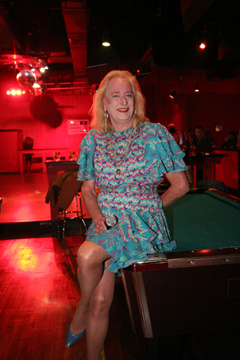 This legend didn’t need an ornate theater full of dazzling lights and extravagant costumes. More fittingly, the Stampede was just as laid-back as ever – pictures of Santa Claus exhorting “Merry Christmas!” mingled with illustrations of shirtless, hairy-chested men in cowboy hats. A twinkling Christmas tree sat next to the DJ booth. And there wasn’t even a stage – just a brightly lit patch of wood floor in front of the bar near the restrooms. She strode into the bar, microphone in hand, at 9 p.m. sharp-all her Wednesday-night benefit shows start with military punctuality – looking at least 6’5″ tall in heels. As the hostess for the Fort Worth “Wall of Food” shows, whose earnings benefit the food pantry at the city’s AIDS Outreach Center, Rhonda Mae was not so much regal as charmingly down-home and self-deprecating. She never dominates these shows, preferring to emcee the proceedings with a maternal touch. This night she favored a simple knee-length black skirt and black short-sleeved blouse with glittery golden swirls. Perched on her aquiline nose were a pair of thick-lensed suburban-mom glasses that covered the top half of her face.
This legend didn’t need an ornate theater full of dazzling lights and extravagant costumes. More fittingly, the Stampede was just as laid-back as ever – pictures of Santa Claus exhorting “Merry Christmas!” mingled with illustrations of shirtless, hairy-chested men in cowboy hats. A twinkling Christmas tree sat next to the DJ booth. And there wasn’t even a stage – just a brightly lit patch of wood floor in front of the bar near the restrooms. She strode into the bar, microphone in hand, at 9 p.m. sharp-all her Wednesday-night benefit shows start with military punctuality – looking at least 6’5″ tall in heels. As the hostess for the Fort Worth “Wall of Food” shows, whose earnings benefit the food pantry at the city’s AIDS Outreach Center, Rhonda Mae was not so much regal as charmingly down-home and self-deprecating. She never dominates these shows, preferring to emcee the proceedings with a maternal touch. This night she favored a simple knee-length black skirt and black short-sleeved blouse with glittery golden swirls. Perched on her aquiline nose were a pair of thick-lensed suburban-mom glasses that covered the top half of her face.
She sidled up to one good-looking Latino man at the end of the bar, ran her long fingers playfully through his hair, and declared in a very deep, cigarette-honed voice, “You know what I want for Christmas: diamonds. But honey, sapphires will do, too.” Then she launched into a lip-synched performance of Tammy Wynette’s hit, “Your Good Girl’s Gonna Go Bad.” Between lyrics she spread her arms and twirled her fingers, sashaying her long legs in a light burlesque routine. The hand gestures were an invitation. Audience members leaned into the spotlight and handed her one- and five- and 10-dollar bills. And after Rhonda Mae left the spotlight, they continued to hand money to other performers who followed-a red-wigged Victoria Lynn mouthing “Merry Fuckin’ Christmas” to the tune of “Takin’ Care of Business,” and a burly fellow in blue-collar garb named Bernie the Bear, who did an impressive cover of Ray Price’s “For the Good Times” with his own voice. All the tips were dropped into a bucket designated for the AOC’s “Nutrition Center.”
But tall, blonde Rhonda Mae was the undisputable star of the evening, even when she just sat in a shadowy corner smoking a cigarette and watching the other entertainers. You couldn’t help but notice her odd vibe of gawkish regality. Perhaps that standout quality comes with the territory of being a self-identified “transsexual” – a person who feels he was born, by some cosmic mix-up, into the wrong gender. Rhonda Mae was born a man, but she has, for much of her adult life, lived as a woman. And what a woman, er, man – Vietnam veteran, machinist, nuclear submarine technician, and occasional stunt pilot/mechanic for vintage World War II fighter craft. Add to that list AIDS activist, HIV survivor, veterans’ advocate, and patron saint of the AIDS Outreach Center’s food pantry. Rhonda Mae is more than a local celebrity and fund-raiser. She’s worn more guises than most men and women could dream about in a lifetime.
Like all fabulous creatures, Rhonda Mae was made, not born. And she was created from the imagination of a once-married father of two named Ron Cox. Ron was born 61 years ago into a conservative, working-class family in White Settlement. The clan moved to Fort Worth when he was 11 years old. Ron attended Baptist church services and vacation Bible schools for a few years, but that was mostly to please his grandfather. When the old man passed on, the Cox family ceased attending services. Like many other transgender folks, Ron occasionally played dress-up as a child. He recalls a devoutly Baptist aunt dressing him in girls’ clothes for a lark, and it immediately felt not just good, but right. Rhonda doesn’t claim to speak for other transsexuals, but she does have one psychological theory about her gradually dawning identification as a female: “Growing up in my house, you got whipped hard when you did something wrong. I got whipped for things I didn’t do, for things my sisters did. And I think, in my mind, I associated being a girl with not being hurt.” To the outside world, though, Ron Cox looked like any other adolescent heterosexual male. The quirkiest thing about him may have been that, while attending Paschal High School, he harbored a desire to take theater classes. But he never made that leap.
Upon graduation, he wasted some college hours before deciding, like many other “normal” high school grads, to enlist in the armed services. He joined the Navy in 1967 during the Vietnam War. Ron figured he might as well make the first move; at that point in history, if college wasn’t part of your plans, “then it was a matter of when, not if, you’d be drafted,” Rhonda recalled. It turned out to be one of the best decisions he ever made. He spent his service at sea on various destroyers, including the USS Joseph P. Kennedy Jr. from World War II. For him, the old recruiting slogan, “Join the Navy, see the world,” really worked – Cox got to visit port cities on both sides of the Atlantic and in the Arctic, the Caribbean, and the Western Pacific. His six-week stint off the coast of Vietnam was, he freely admits, “pretty much a bore” – his feet never touched Vietnamese soil. He worked as a machinist in the engine room of the destroyer, which provided fire support for U.S. troops ashore. “The engine room must’ve been 120, 130 degrees,” he said. “And every time the ship fired a gun, the paint would crack, and you’d get showered in paint chips.”
Ron served a total of four years as a Navy machinist. In 1971, during his training in upstate New York on nuclear submarine operation and maintenance, he met his soon-to-be wife Sandra. They got married because, as Rhonda recalls, “I’ve always been very self-assured, but I couldn’t resist doing what society expected of me.” After his enlistment was up, the couple moved to Fort Worth, and Ron got a job in management at General Dynamics. He also earned a pilot’s license and, on the side, performed in occasional WW II commemorative air shows piloting vintage fighters sponsored by a nonprofit preservation organization called The Confederate Air Force down in the Rio Grande Valley. (It has since been renamed the Commemorative Air Force and relocated to Midland International Airport. Rhonda Mae hasn’t flown since 1985, after the second time she “almost walked into a propeller” inside the hangar.) He and Sandra had two kids, a son and a daughter, but it was clear early on that the romantic and sexual elements of the relationship were practically absent. Ron knew, early in his marriage, of his affinity for dresses and for other men, although he didn’t say anything to Sandra for five or six years. He went shopping on the sly, mostly at resale stores, for the few tall-size women’s outfits they had.
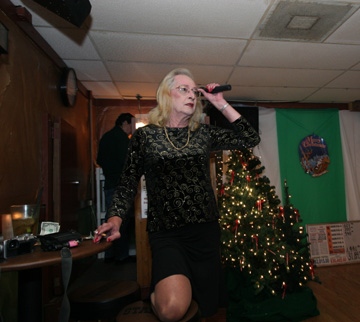 When he finally confessed to Sandra that his powerful urge to dress as a woman could no longer be quelled, his wife took it with surprising calm. Despite that, “I know it knocked her for a loop,” he said. “She told me later she thought it was a phase I’d get through.” Perhaps feeling she could help purge these inclinations by complying, Sandra began to go shopping with him for women’s clothes – at least it helped cut down on the disapproving stares he received. At first he wore women’s clothes only at home in the evening, but by 1978 those high school dreams of stardom kicked into high gear, and he made the transition to a country-and-western drag act named Evelyn. By day he was a white-collar General Dynamics worker; by night he lip-synched Tammy Wynette and Dolly Parton in glittery gowns at a gay bar on Jacksboro Highway, long since closed. Rhonda Mae said she was never particularly concerned about being discovered by her bosses, because the gay and straight worlds were so rigidly segregated. Besides, “If someone I worked with came in, how would they explain what they were doing there in the first place?” Some nights Sandra accompanied him, and she began to mix with gay men in Fort Worth’s very closeted scene.
When he finally confessed to Sandra that his powerful urge to dress as a woman could no longer be quelled, his wife took it with surprising calm. Despite that, “I know it knocked her for a loop,” he said. “She told me later she thought it was a phase I’d get through.” Perhaps feeling she could help purge these inclinations by complying, Sandra began to go shopping with him for women’s clothes – at least it helped cut down on the disapproving stares he received. At first he wore women’s clothes only at home in the evening, but by 1978 those high school dreams of stardom kicked into high gear, and he made the transition to a country-and-western drag act named Evelyn. By day he was a white-collar General Dynamics worker; by night he lip-synched Tammy Wynette and Dolly Parton in glittery gowns at a gay bar on Jacksboro Highway, long since closed. Rhonda Mae said she was never particularly concerned about being discovered by her bosses, because the gay and straight worlds were so rigidly segregated. Besides, “If someone I worked with came in, how would they explain what they were doing there in the first place?” Some nights Sandra accompanied him, and she began to mix with gay men in Fort Worth’s very closeted scene.
“There are real marriages and then there are ‘marriages,'” Rhonda Mae said. By the time “Evelyn” began performing, Sandra and Ron were living as platonic friends. They agreed to stay married until their son, the younger child, graduated from high school, although Ron did move into an apartment near the bars before then. After almost a quarter-century of marriage, they divorced in 1994, and Sandra moved back to New York. He claims they’re still on friendly terms. “I put her through a lot, I know,” Cox said with more than a hint of sadness. “And I regret that, because she’s a wonderful person.” But he felt that the choice to live as a woman was out of his hands – to avoid a future that looked more and more painful and dishonest, he had to eventually become Rhonda Mae. If you want to know how much things have changed for gays and lesbians over the last three decades in Fort Worth, ask Rhonda Mae or 70-year-old James Allen, a concert promoter who’s owned and operated gay establishments in Arlington and Fort Worth since the mid-’70s. The two have been friends and business associates for at least 25 years now.
Rhonda recalled when the Fort Worth police would drive around the parking lots of suspected gay gathering spots (unmarked from the outside, natch) and write down the license numbers of cars. The Fort Worth Star-Telegram would print them as part of an ongoing crusade to uphold “community standards.” Allen remembered being in a bar near Casa Mañana owned by a lesbian couple when two cops walked in, picked three patrons at random, and arrested them for “indecent exposure.” “The only ‘indecent exposure’ that went on was getting caught in an ‘indecent’ place like a gay bar,” Allen grumbled. And yet, for all the secrecy and shame that accompanied that era, Cox and Allen agreed that there were many more small gay and lesbian establishments than exist today, and they were scattered all around the city – South Jennings, 7th Street, University Drive, Jacksboro Highway. The two met in 1982, when Ron was still slowly transitioning out of the corporate world of General Dynamics into the gay scene, where he could wear women’s clothes on the job and not just as a drag entertainer. Allen said Ron walked into one of his establishments – the conjoined bars known as The Office and The Break Room – and said, “Can I bartend for you wearing women’s clothes?” Allen recalled his answer: “You can bartend naked if it makes the registers ring.”
And so began a long series of jobs bartending, managing, and performing in multiple bars around town, most long since gone. She ditched the drag sobriquet “Evelyn” when a patron told her one night after a show, “You don’t look like an Evelyn. You look like a Rhonda Mae.” Rather than being insulted, Ron/Evelyn adopted the title. In any case, she was spending more and more hours in a dress and makeup, gunning for the time when she could live as a woman by day as well as night. It was daunting, and she understood a subtle but important distinction: “Drag queens have it easier. They can take off their wig and makeup and return to society as a man during the day. Transsexuals don’t have a choice but to wear the clothes and get used to the stares.” (Generally speaking, transsexuals have had or are on the path toward gender reassignment surgery – they live 24/7 as the opposite sex. Cox, however, never made that physical transition.)
But as the ’80s advanced and Cox moved closer to total immersion in the gay community, a cruel and deadly specter began to haunt the community. She and Allen had heard stories from New York and San Francisco of gay men dying from what was variously referred to as “gay cancer” and “gay pneumonia,” a disease given the initial medical diagnosis “GRID (Gay Related Immune Disorder).” They were nervous, certainly, but the real terror didn’t set in until friends and lovers in Fort Worth began to develop strange infections and cancers that left them looking like concentration-camp prisoners. Nobody knew what caused it, and if holier-than-thou heterosexuals were beginning to stigmatize gay men as “deserving” their fate, gays themselves weren’t always immune to discrimination against one another. “I can remember in some bars in Fort Worth,” Allen said, “if you bought a drink, and the bartender knew or even suspected you had AIDS, they didn’t bother to wash the glass you drank from. They just threw it away.”
When the Community Outreach Center was finally opened in 1986 to assist HIV-positive individuals, there wasn’t an official food pantry. People were losing their jobs, their loved ones, and their homes because, at that point, HIV was not a disability covered by Social Security benefits. To the gay and lesbian community’s enormous credit, individuals who spent their lives loitering in the bar scene became activists to fill the void. Rhonda Mae and Allen, among others, began to buy and deliver food to the houses and apartments of those who were ill but not yet hospitalized. They began coordinating with the Community Outreach Center, which had yet to receive the government funding it needed. Some say the center’s food pantry began at the old 651 bar, co-owned by Allen and managed/bartended by Rhonda Mae. Patrons would drop the change from the drinks they purchased into a jar, which funded the ad hoc food distribution.
When asked why she made the nutrition arm of AIDS activism her priority, Rhonda Mae said: “They were all so thin. I thought, ‘If we can keep them fed, then they’ll stay alive long enough until something – a cure, a treatment – came along.'” They were running on sheer hope. The Wall of Food shows began at Allen’s Office/Break Room bars in 1989. The concept was simple: Schedule weekly variety shows featuring drag queens, singers, strippers, hell, anyone who wanted to stand up and show off. Audience members would tip the performers during or after their routines, based on how much they enjoyed it. Rhonda Mae was host and performer, and her longtime pal Yogi – then and now, the only African-American bartender in Fort Worth’s gay scene – served up the libations. They were amazed by the instant popular reception. In the early days, one evening could net as much as $2,000 or $3,000.
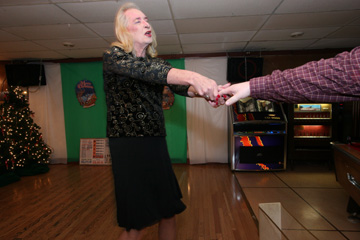 The term “Wall of Food” came about because Rhonda Mae insisted on bringing the boxed foodstuffs she purchased in bulk from Sam’s Club – breakfast cereal, cans of stew, peanut butter, instant mashed potatoes – to the bar and then building a fortress with it around the stage area. She wanted the people to see exactly what their cash was going for. “Man, that was backbreaking,” recalled Yogi. “Back then, Rhonda and I were the only people who shopped for the food, built the wall, took it back down, and then brought it to the Outreach Center. The ‘wall of food’ could stretch all the way to the ceiling. There were no other volunteers. We’re senior citizens now, so there’s no way we could do that.” From 1989 through ’95, Rhonda Mae and Allen estimate by receipts that more than $300,000 was raised to feed the needy among Fort Worth’s HIV population. With the passage of the Ryan White Care Act, still the largest federally funded program for people with HIV/AIDS, and the appointment of an AIDS czar by the Clinton administration, the coffers of national AIDS programs – including Fort Worth’s renamed AIDS Outreach Center – began to fill. Local activists could relax, at least a bit. Rhonda Mae had little reason to suspect that she would eventually be the recipient of the same largesse doled out by government and private donors, that she might one day become the object of her own outreach program. But with a sexually transmitted virus like HIV, it only takes one slip-up.
The term “Wall of Food” came about because Rhonda Mae insisted on bringing the boxed foodstuffs she purchased in bulk from Sam’s Club – breakfast cereal, cans of stew, peanut butter, instant mashed potatoes – to the bar and then building a fortress with it around the stage area. She wanted the people to see exactly what their cash was going for. “Man, that was backbreaking,” recalled Yogi. “Back then, Rhonda and I were the only people who shopped for the food, built the wall, took it back down, and then brought it to the Outreach Center. The ‘wall of food’ could stretch all the way to the ceiling. There were no other volunteers. We’re senior citizens now, so there’s no way we could do that.” From 1989 through ’95, Rhonda Mae and Allen estimate by receipts that more than $300,000 was raised to feed the needy among Fort Worth’s HIV population. With the passage of the Ryan White Care Act, still the largest federally funded program for people with HIV/AIDS, and the appointment of an AIDS czar by the Clinton administration, the coffers of national AIDS programs – including Fort Worth’s renamed AIDS Outreach Center – began to fill. Local activists could relax, at least a bit. Rhonda Mae had little reason to suspect that she would eventually be the recipient of the same largesse doled out by government and private donors, that she might one day become the object of her own outreach program. But with a sexually transmitted virus like HIV, it only takes one slip-up.
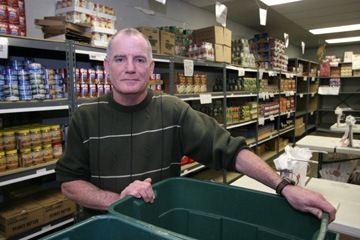 “I was always the first in line to get tested when the Outreach Center conducted HIV tests in the bars,” she said. “I was always the one preaching the loudest about safer sex and prevention and condom use. And in 1995, I was in the front of the line to get my blood drawn.” And the test came back positive. She had sero-converted. She claimed to know the instance when the infection probably occurred – the one lazy encounter, the one casual experience when she’d relaxed the watch and didn’t insist on a condom. “The community,” which had been so vital in rallying together when outside resources were nonexistent, again fell ill with what Allen called “survivor fatigue.” “We’d buried so many people,” he said. “I can’t count the number of funerals I went to. And people were still scared.” Rhonda Mae found that some friends turned away from her, perhaps out of that “survivor fatigue,” perhaps suspecting that she’d been a hypocrite in championing safer sex while not practicing it herself. In any case, she dropped out of the scene for a while. For two long years she was treated by doctors with a regimen of the now-infamous drug AZT; Rhonda Mae said it made her a prisoner in her own apartment. “I couldn’t get any farther than 15 feet from a bathroom,” she said of the constant nausea and diarrhea, symptoms she chalked up to the drugs rather than the virus.
“I was always the first in line to get tested when the Outreach Center conducted HIV tests in the bars,” she said. “I was always the one preaching the loudest about safer sex and prevention and condom use. And in 1995, I was in the front of the line to get my blood drawn.” And the test came back positive. She had sero-converted. She claimed to know the instance when the infection probably occurred – the one lazy encounter, the one casual experience when she’d relaxed the watch and didn’t insist on a condom. “The community,” which had been so vital in rallying together when outside resources were nonexistent, again fell ill with what Allen called “survivor fatigue.” “We’d buried so many people,” he said. “I can’t count the number of funerals I went to. And people were still scared.” Rhonda Mae found that some friends turned away from her, perhaps out of that “survivor fatigue,” perhaps suspecting that she’d been a hypocrite in championing safer sex while not practicing it herself. In any case, she dropped out of the scene for a while. For two long years she was treated by doctors with a regimen of the now-infamous drug AZT; Rhonda Mae said it made her a prisoner in her own apartment. “I couldn’t get any farther than 15 feet from a bathroom,” she said of the constant nausea and diarrhea, symptoms she chalked up to the drugs rather than the virus.
Finally, she refused further AZT preDELETEions from her doctors, deciding to try a regimen of exercise, diet, and no drugs. Her health improved and remained stable for years, although the virus has since gone in and out of remission like cancer. Sometimes her tests show no detectable viral load, and at other times her T-cell count has gone as low as 202, dangerously close to the unlucky number 200 that physicians diagnose as full-blown AIDS. She has toddled, in high heels and skirt, somewhere in that minefield of shifting test results ever since. Two things brought Rhonda Mae out of retirement – the gradual gutting of AIDS funding during the George W. Bush administration and the resurgence of the HIV virus in new and unexpected places. Indeed, it was a relative newcomer who came to Rhonda in 2004 for help when the AOC cupboard started to look bare again. Tom Berwanger has been director of the AIDS Outreach Center’s food pantry – officially, the “Nutrition Center” – for seven years now. Visiting the bars, he’d certainly heard of Rhonda Mae and her heroic Wall of Food shows. Then after the Republican-dominated Congress passed a series of federal budgets slashing large chunks from the funds that AIDS centers had been taking for granted, he searched her out and asked for help. “I don’t know if the Iraq war has taken first place over domestic needs, or what,” said Berwanger, who’s cautious in expressing what are clearly harsh opinions. “I can’t tell you how the federal government thinks. I just know that funding for the Nutrition Center [from the Ryan White Act] has fallen by 60 percent over the last three years.”
That’s a result of rethinking priorities in the fight against AIDS, the official argument goes: Since the development of effective but expensive drug “cocktails” has lengthened both the span and quality of life for HIV patients, the assumption has been that infected people are able to work and meet their own survival needs, including groceries. And so the food pantries get short shrift. “The emphasis for funding is now on medical treatment,” Berwanger said. “That’s fine, but I don’t understand how nutrition can be separated from a client’s overall health.” What also isn’t considered, he said, is the number of people for whom the recent drug combinations don’t work – a higher percentage than is often reported. The Outreach Center has homeless clients, patients with chronic addiction and mental health issues, and those who’re just squeaking by on the paychecks they manage to earn. In meeting the Nutrition Center’s shortfall, Berwanger said, Rhonda Mae and her Wall of Food revues have been “absolutely essential.” She has raised close to $85,000 since the shows resumed in 2004. Without those performance tips from bar-goers, the center would have to either eliminate clients or cut down on portion sizes. Plus, Rhonda Mae (who has taken to placing the Sam’s bulk orders online and shipping straight to the pantry for convenience) has deliberately purchased the more expensive, high-protein items like chilis, stews, and soups that otherwise would’ve been missing from the pantry shelves.
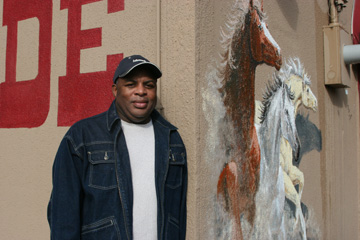 Yogi, Rhonda Mae’s original bartender-sidekick, retired from the Wall of Food shows back in 1995. He has been to a few of the new gigs, and while the enthusiasm was just as high, the crowds, he thought, were notably smaller than in the early days. He believes this is a sign that a new generation has encountered less homophobia in the wider world. “This younger generation, they have a bigger choice of nightlife [than in the past],” he said. “I have younger friends, and I find myself meeting them at the Flying Saucer or whatever. Some nights you’ll be at a ‘straight bar’ in downtown Fort Worth, and half the patrons there will be gay. There’s just more freedom.” There’s also less discrimination about the AIDS virus these days. But that’s largely within the gay community: HIV is spreading into new and different territories, which means different educational campaigns must be utilized. Whereas white gay men were the first demographic to be hit back in the ’80s, Berwanger said that the majority of his current AIDS Outreach Center patrons are African-American and Hispanic. The Latino families often shop at the pantry together with their children, since in many cases both husband and wife are infected. The African-American women and men with HIV tend to visit separately.
Yogi, Rhonda Mae’s original bartender-sidekick, retired from the Wall of Food shows back in 1995. He has been to a few of the new gigs, and while the enthusiasm was just as high, the crowds, he thought, were notably smaller than in the early days. He believes this is a sign that a new generation has encountered less homophobia in the wider world. “This younger generation, they have a bigger choice of nightlife [than in the past],” he said. “I have younger friends, and I find myself meeting them at the Flying Saucer or whatever. Some nights you’ll be at a ‘straight bar’ in downtown Fort Worth, and half the patrons there will be gay. There’s just more freedom.” There’s also less discrimination about the AIDS virus these days. But that’s largely within the gay community: HIV is spreading into new and different territories, which means different educational campaigns must be utilized. Whereas white gay men were the first demographic to be hit back in the ’80s, Berwanger said that the majority of his current AIDS Outreach Center patrons are African-American and Hispanic. The Latino families often shop at the pantry together with their children, since in many cases both husband and wife are infected. The African-American women and men with HIV tend to visit separately.
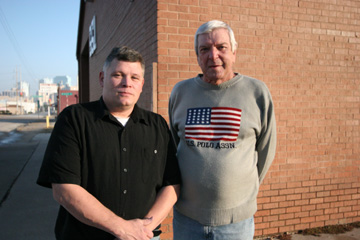 This new face of AIDS is probably AWOL when Bernie the Bear does his annual Christmas Wall of Food performance. It’s called “Walkin’ in Women’s Underwear” and set to the tune of “Walking in a Winter Wonderland,” and he sings it wearing only heels, a jockstrap, and a teddy on his bulky frame. Regardless, those new groups at the AOC pantry will benefit from the big donation haul that Bernie’s performance invariably draws. Rhonda Mae is officially retired as a professional machinist, flight engineer, and bartender/manager. She lives on the Social Security disability benefit that people with HIV can now draw. Still, in addition to reviving the Wall of Food shows, she has parlayed her macho past into a new cause – helping the gay veterans of Fort Worth. For the past six years, Rhonda Mae has sponsored a Veterans Day bar bash, first at Crossroads and then at Stampede. Beforehand, she gathers photos of local veterans from their service days, including World War II (“there are still a couple around”), the Korean War, the Vietnam War, and the first Gulf War. She has those photos blown up into 8-by-10 images and hung along the walls of the bar. Veterans are invited to wear their original service-issued uniforms, and the audience tries to decide who’s who from the posted photos.
This new face of AIDS is probably AWOL when Bernie the Bear does his annual Christmas Wall of Food performance. It’s called “Walkin’ in Women’s Underwear” and set to the tune of “Walking in a Winter Wonderland,” and he sings it wearing only heels, a jockstrap, and a teddy on his bulky frame. Regardless, those new groups at the AOC pantry will benefit from the big donation haul that Bernie’s performance invariably draws. Rhonda Mae is officially retired as a professional machinist, flight engineer, and bartender/manager. She lives on the Social Security disability benefit that people with HIV can now draw. Still, in addition to reviving the Wall of Food shows, she has parlayed her macho past into a new cause – helping the gay veterans of Fort Worth. For the past six years, Rhonda Mae has sponsored a Veterans Day bar bash, first at Crossroads and then at Stampede. Beforehand, she gathers photos of local veterans from their service days, including World War II (“there are still a couple around”), the Korean War, the Vietnam War, and the first Gulf War. She has those photos blown up into 8-by-10 images and hung along the walls of the bar. Veterans are invited to wear their original service-issued uniforms, and the audience tries to decide who’s who from the posted photos.“Usually, the cap is the only part that still fits,” she quipped.
Rhonda Mae has been battle-scarred herself from the AIDS fight and the years living as an unapologetic transgender person, but she’s no defeatist. For one thing, a cocktail combination of the drugs Trubada and Biramune has so far kept her health on an even keel. She has stayed in contact with her ex-wife Sandra in New York; her daughter, who lives in Oklahoma (“she was always accepting of my life as a woman”); and her son in Wyoming, who isn’t completely reconciled to Dad’s life. Still, they maintain communication, as does Rhonda Mae’s eightysomething father, the man who whipped her and made her think girls can’t be hurt. (Rhonda Mae’s mother came to several bar shows and applauded her son’s performances before her death two years ago.) The old man has struggled with his son’s choices but has made an effort to understand. “My biggest thrill would be if my father came to see one of my shows,” said Rhonda Mae, although she doesn’t hold her breath waiting for that to happen.
Despite her years of efforts on the front line against AIDS, Rhonda Mae is sad about reports that infection rates are rising again among both gay and straight people. “The fastest-rising age group of the infected is in their 20s,” she lamented. “People aren’t getting the message. They seem to forget that despite the new drugs, it’s still a fatal disease.” She’s gathered and signed all the paperwork to drive down to the courthouse and, for a $200 fee, have her name legally changed from Ron Cox to Rhonda Mae Cox. But she hasn’t made that drive yet. She’s always been a procrastinator, she said. And although she’s long considered having the gender reassignment surgery to officially give her a woman’s body, it may not be worth the hassle now. “At the age of 61, I’m not sure it’s necessary,” Rhonda Mae said with a chuckle. “If I had the surgery, I wouldn’t be ‘Rhonda Mae’ anymore. I’d just be one more little old lady.”
You can reach Jimmy Fowler at jimmy.fowler@fwweekly.com.











